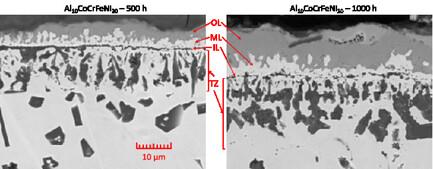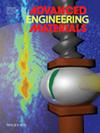Long‐Term High‐Temperature Oxidation of Al10CoCrFeNi30 High‐Entropy Alloy
IF 3.4
3区 材料科学
Q2 MATERIALS SCIENCE, MULTIDISCIPLINARY
引用次数: 0
Abstract
The combined effects of high‐temperature and long‐term exposure to oxidation environment on an AlCoCrFeNi‐based high entropy alloy (HEA) are investigated. The alloy has a composition of Al

Al10CoCrFeNi30 高熵合金的长期高温氧化作用
研究了高温和长期暴露于氧化环境对铝钴铬镍基高熵合金(HEA)的综合影响。该合金的成分为 Al10Co20Cr20Fe20Ni30 (at%),在实验室空气中于 1000 °C 下氧化 1000 小时,以模拟燃气轮机的工作条件和长运行周期。利用扫描电子显微镜、能量色散光谱和 X 射线衍射对 HEA 的微观结构和氧化物形成进行了表征。HEA 的性能与 Inconel 625 和 Hastelloy X 相比,在 750 小时之前的氧化动力学慢于 Inconel 625。HEA 的氧化层是三种合金中最薄的,并呈现出三重结构,即连续的 Cr2O3 外鳞片、半连续的 Al2O3 子鳞片和深层 AlN 沉淀。基体在 1000 小时后出现了铬和铝耗尽的迹象,导致其无法取代蒸发或剥落的降解氧化鳞片,并降低了其长期抗氧化性。总体而言,HEA 在 750 小时之前表现出良好的抗氧化性,但如果表面的铝含量更高,形成更持久的 Al2O3 子鳞片,则在 750 小时之后仍具有保护作用。
本文章由计算机程序翻译,如有差异,请以英文原文为准。
求助全文
约1分钟内获得全文
求助全文
来源期刊

Advanced Engineering Materials
工程技术-材料科学:综合
CiteScore
5.70
自引率
5.60%
发文量
544
审稿时长
1.7 months
期刊介绍:
Advanced Engineering Materials is the membership journal of three leading European Materials Societies
- German Materials Society/DGM,
- French Materials Society/SF2M,
- Swiss Materials Federation/SVMT.
文献相关原料
| 公司名称 | 产品信息 | 采购帮参考价格 |
|---|
 求助内容:
求助内容: 应助结果提醒方式:
应助结果提醒方式:


